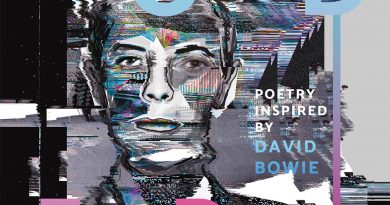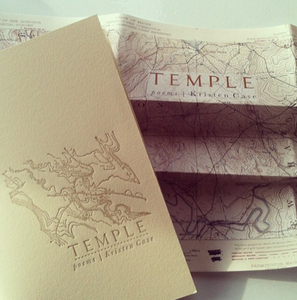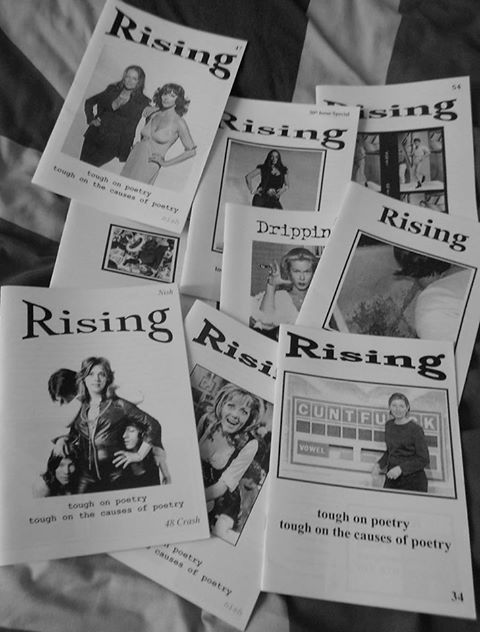‘i wrote a poem dedicated to god that i considered to be extremely disrespectful’ by Diane Marie
-Reviewed by Charles Whalley–
Diane Marie’s i wrote a poem dedicated to god that i considered to be extremely disrespectful is self-published as a 20 page PDF on Scribd. It appears to have been written for a PDF format: each page marks a new poem in the sequence, and each word is aware of its position on the page. It is typographically quirky; every single I, on its own or within words, is italicised (I won’t attempt to reproduce this in my quotations). In publishing online like this, the sequence marks itself out as part of alt lit, which can be better described as a community than a movement or a genre. Indeed, often the only distinguishing characteristic of alt lit, as i wrote a poem dedicated to god… can be categorised, seems to be its publication practice; however, alt lit, and Diane Marie’s poetry, show signs of a shared aesthetic that is best described as post-internet. The simplest definition of post-internet art I’ve seen is that it treats the internet as banal rather than novel. I suppose the online publication can be seen as part of this, as it is easier to pretend the C21st doesn’t exist when one’s poems are in print. And whilst artists are often placed as pre- or post-internet based on their age – as in, whether they grew up without or with the internet – their art, by birth, is post-internet, and so has no reason not to reflect the same pressures. It is fair to accuse pre-internet poetry written in a post-internet age of redundancy. i wrote a poem dedicated to god… is certainly post-internet in its outlook and aware of the backwards glance in ‘post’.
It is a sequence mostly concerned with connectedness despite everything. The backdrop of the poems is a gentle apocalypticism, of the melancholy of those of us hanging around after the end of history. A dog-walker, who appears in a few of the poems, “thinks about the way the earth moves slower every year” as, we are told elsewhere, “ev’rything is/slowing down”. The dog-walker, with his stopped watch, is trapped in inactivity through the sequence, waiting “for the dog to change his mind about the rest of/the walk”. Something like this idea appears in the sequence: “JOAN OF ARC WAS A WITCH AND A BELIEVER//I AM NOT EITHER”. The first line, to be heretical, can be understood as “Joan of Arc partook in the system by which she was condemned” or “Joan of Arc still drew personal meaning from a system which would kill her”. The speaker of the poem is free from accusations of witchcraft but also excluded from belief. This mood invokes the paradoxical situation of the networked post-internet individuals of the C21st: more connected than ever, yet more aware of our isolation as a result.
It is against this backdrop that the sequence explores the possibility of connections. To quote the penultimate poem in full:
it is the future now
and we are both dead
a long time ago
but i still love you
Much of the sequence covers the characters within the dog-walker’s “tableau of dog and lead and/ man and bench”, connected by their views of each other. Some of the best lines in the poems are descriptive, as they play with sublimity and excess and the way in which the external world connects to the individual, or the individual practices a mode of sight upon the world. The third poem, for example, is one long sentence, beginning:
and the beach below is wild and coarse dark
sand and great green-smeared curves and the
sea is huge and deep and wholly blue and
overhung with a thick grey wall of cotton-wool
sky and climbing the dunes and dry rock bluff
are samphire glasswort aster and thrift
The unbearable excess of the external world is portrayed most in a poem which begins “There was visibility in all directions”, and follows a pattern of slowly varying sentences about the horizon and the sky and everything creating the appearance of being “in the center of some body of water”, accumulating into “The/impression was obliterating.” The impression, the subjective sensation that obliterates the observer’s mode of seeing, is what we are looking at, not the object of their sight. This is important, as the mode of seeing incorporates an emotional response, and it is this emotional response to impressions that gives rise to the empathetic connections between people that the sequence also explores.
Crucially, the characters in the dog-walking tableau never seem to share a glance, as a smoking woman “wonders what would/happen if the man standing still looked up”. Many of these gazes act as a prompt towards connection via the common experience (as a burden and a joy) of the body. As well as the smoking woman, the dog-walker and his dog are seen by a “passing cyclist” who “notices/all four eyes on the man and the dog/blinking in unison and blinks also”. That the man and dog’s eyes are numbered individually rather than pairs implies surprise not only that the man and dog are blinking in unison with each other, but that they are blinking in unison with themselves. The cyclist then becomes aware of his own body, as in a later poem, “suddenly acutely/aware of his eyelids.” This poem then fills the rest of the page with closing brackets, which make the reader’s eyes feel funny too; we are blinking at the cyclist’s blinking at the man and dog’s blinking. As the sequence’s second poem, coming directly after the cyclist’s blink, runs: “oh shit i have//”feelings”.” There is a joke in the faux-ironic speech marks, but it suggests the sense of physical sensation in the word “feelings” (rather than, say, ‘emotions’) and holds this up against C21st isolation. The sequence, like much post-internet literature, exploits the visceral and the physiological as a route towards sincerity, or as a route at least to provoke any sort of reaction at all.
It’s a very impressive set of poems, albeit with some messiness; I can’t get much out of one poem which goes over the words “rain”, “rein” and “reign”, even if it does combine this with some of the wittiest lines of the sequence, such as the sequence’s title or the final lines: “do a radio interview and/i don’t know the exact reasons.” But i wrote a poem dedicated to god…’s patchiness can be forgiven for its cleverness and the direction of literature that it represents.
You can read some more poems by Diane Marie here.





Pingback: The Sabotage Reviews top 10 of (published) poetry this year | Sabotage